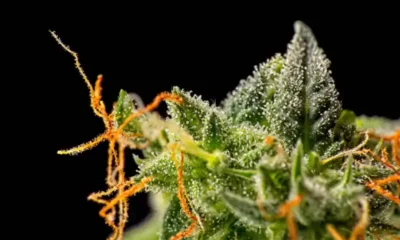Connect with us
Published
3 months agoon

Ireland, like many nearby countries with a legal medical cannabis program, is limited to a list of select medical conditions and a number of specific cannabis-based products for those looking to gain a medical cannabis prescription. Patients can also only be prescribed medical cannabis if they have not responded to standard treatments.
Currently, the only products included under the country’s Medicinal Cannabis Access Programme (MCAP) are CBD oil drops, oral solutions, and cannabis flower.
The country is seeing a slow and steady progression, having opened its first cannabis clinic in 2023 four years after officially launching its medical cannabis program, and now Ireland’s Health Research Board (HRB) is evaluating the efficacy and safety of prescribed cannabis.
The HRB recently published a comprehensive review of literature on medical cannabis, focusing on its ability to treat a range of health conditions. According to the board, the study was meant to serve as a review of Ireland’s MCAP.
Evidence Supports Current Qualifying Conditions, ‘Lack of Quality’ Studies
The HRB study looked at over 30 years of evidence focusing on the clinical efficacy and safety of medical cannabis for adults with a number of conditions. Given the limited products available in the Irish medicinal cannabis program, the review also focused on evidence related to products containing natural or synthetic CBD or THC or their derivatives.
It ultimately found evidence to support the use of prescribed medicinal cannabis for certain conditions already approved in Ireland, like nausea, vomiting in cancer patients and spasticity in multiple sclerosis (MS). Additionally, the HRB notes evidence of “significant benefit” for neuropathic or nerve pain related to MS, diabetes or spinal cord injury.
However, HRB said that there is “no conclucive [sic] evidence to confirm the efficacy of prescribed medicinal cannabis” pertaining to anxiety and pain in conditions like cancer, rheumatic diseases and fibromyalgia. The agency said that there is a lack of quality in primary studies, which makes it challenging to draw “well-founded conclusions about the relative benefits (or lack thereof) of medicinal cannabis” for any condition.
Despite this assertion, there have been a number of recent studies confirming the efficacy of cannabis for treating symptoms like pain, with many showing that cannabis is comparable in treating pain to traditional methods like opioids and more showing that medical cannabis can help patients to take less opioids or stop taking them entirely.
Additional Findings and Next Steps
The HRB also noted that serious adverse effects for medicinal cannabis use are uncommon, though there is some evidence of side effects like dizziness, dry mouth, sedation and headache. The agency reported that there is “mixed evidence” surrounding the likelihood of other adverse events like drowsiness, nausea and “any psychiatric disorder adverse events.”
HRB Research Officer Dr. Kathryn Lambe, who authored the report, underscored the findings that there is evidence to support medicinal cannabis as a treatment for conditions like nausea and vomiting due to chemotherapy, MS spasticity and managing neuropathic pain. Still, she said for most other outcomes, findings were “inconsistent at best,” adding that the review will be used to determine decisions relating to future policy on medical cannabis use. She also said the HRB plans to seek input from patient groups, clinicians and service planners.
“It is essential that healthcare policy is informed by the latest evidence, including in areas where existing research is not sufficiently developed to draw robust conclusions,” said HRB Chief Executive Dr. Mairead O’Driscoll. “By conducting this kind of review over time, the HRB can continue to provide policy makers with evidence to inform their decisions as research evolves.”
Recreational cannabis remains illegal in Ireland, and while support for legalization among citizens has remained low, it’s increased over time—19.1% in 2006/07 to 29.9% in 2019/20 according to a recent survey. Authors speculated that “the potential medical utility of cannabis-based products may have led to Irish people having a more positive view of cannabis in general.”


Despite City Efforts, Hemp Shops Posing as Dispensaries Prevail in Las Vegas


Cannabis Community, Investors React to DEA Decision To Reschedule


Georgia Governor Signs Bill Establishing Licensing Requirements To Grow Hemp


Study: Psilocybin Enhances Meditation


Ohio GOP Lawmakers Debate Adult-Use MJ Priorities, Eye June for Regulation Approval


Taylor Swift Puts Narcotics Into All of Her Songs on ‘The Tortured Poets Department’
